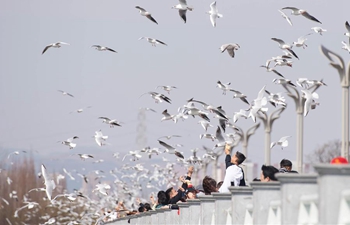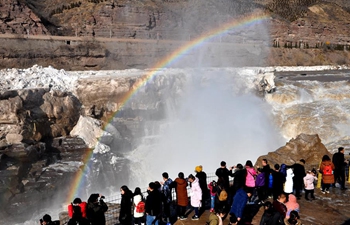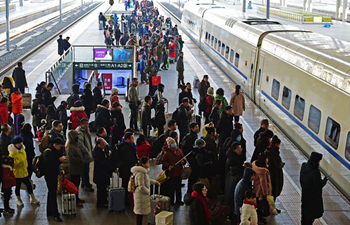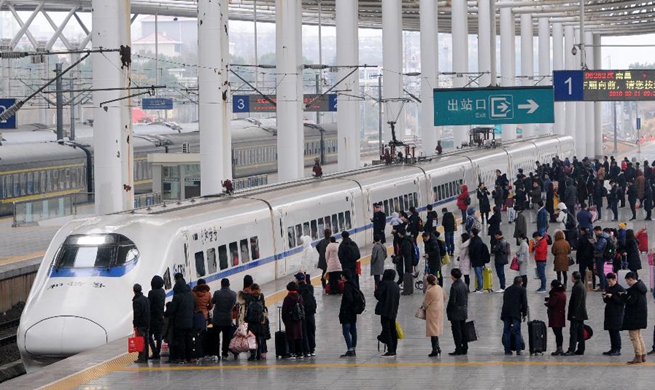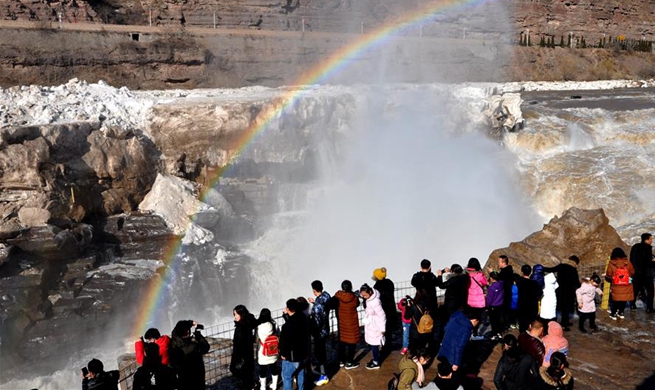UNITED NATIONS, Feb. 20 (Xinhua) -- The UN special coordinator for the Middle East peace process, Nikolay Mladenov, on Tuesday voiced concern over the escalation of violence between Israelis and Palestinians.
"As the peace process falters and the gulf between the two sides widens, Palestinians and Israelis continue to suffer the violent consequences on the ground," Mladenov told the Security Council in a briefing.
Seven Palestinians were killed by Israeli security forces in various incidents across the occupied Palestinian territory and one Israeli civilian was stabbed to death by a Palestinian in the West Bank, he said.
Three of the Palestinians killed died during violent clashes with security forces. One of them, a 16-year-old, was shot near Ramallah. He was the fourth child killed in such circumstances since the beginning of the year, said Mladenov.
"I once again emphasize that the use of force must be calibrated and that lethal force should only be used as a last resort, with any resulting fatalities properly investigated by the authorities. I urge Israeli security forces to exercise maximum restraint to avoid casualties under such circumstances."
He called on all sides to reject violence, condemn terror, ensure accountability and work to reduce tensions.
Mladenov also expressed concern over the "dangerous security incidents" in and around the Gaza Strip.
On Saturday, four Israeli soldiers were wounded by an improvised explosive device placed at the Gaza fence. This was followed by Israeli airstrikes on some 18 Hamas targets, while Palestinian militants fired two rockets into Israel -- one causing damage to a house. Two Palestinian teens were killed by Israeli security forces while reportedly attempting to approach the fence, said Mladenov.
Prior to this latest flare-up during the course of the past month, three more rockets were fired toward Israel, with two Israeli retaliatory airstrikes, all without injuries, he said.
"I encourage the international community to join the United Nations in calling on militants in Gaza to refrain from such provocations and end the building of tunnels and the firing of rockets toward Israel. Such actions, and the response they elicit, only risk the lives of Palestinians and Israelis, undermine peace efforts and increase the likelihood of another devastating conflict."
Mladenov highlighted the dire humanitarian situation in Gaza. "Month after month, we have raised the alarm about the humanitarian, economic and ecological calamity under way. It bears repeating that the situation is unsustainable."
Continuing power cuts of up to 20 hours per day severely undermine the provision of basic services. Without additional immediate fuel deliveries, the situation could deteriorate with dramatic consequences, he said.
As the humanitarian crisis in Gaza escalates, the implementation of the Egyptian-brokered intra-Palestinian agreement has stalled, he said. "Absent immediate steps to address the humanitarian crisis and to revive the economy, we will face a total institutional and economic collapse in Gaza. This is not an alarmist prediction, this is a fact."
For a decade, 2 million people have lived in Gaza under the full control of Hamas with crippling Israeli closures and movement and access restrictions. Throughout this period the international community has provided aid and humanitarian assistance to alleviate the suffering and to rebuild what was destroyed in three devastating conflicts, he noted.
"It is time to break this cycle. It is time to return Gaza back to the control of the legitimate Palestinian Authority, for there can be no Palestinian state without Palestinian unity," said Mladenov. "Those who stand in the way of reconciliation hurt the Palestinian national cause and the price will be paid by generations of ordinary people."
He urged the international community not to give up on support for the moderate Palestinian leadership or on building up the institutions that will increase the chances of success. "Our window of opportunity is closing and, if we do not seize it quickly, the Israeli-Palestinian conflict will be engulfed in the whirlwind of religious radicalization that remains present in the region," he warned.
He reported that Israel's illegal settlement-related activities continued unabated in the past month. In response to last month's killing of a resident of the illegal Havat Gilad outpost, Israel on Feb. 4 approved the establishment of a new settlement to absorb its residents. "I strongly denounce the expansion of the settlement enterprise as compensation for Israeli deaths. Settlement construction is not a morally appropriate way to respond to murder."
On Feb. 12, Israel also advanced two settlement plans for some 85 housing units near Bethlehem, he noted. "I reiterate the long-standing UN position that all settlement-related activities are illegal under international law and are a substantial obstacle to peace. And I call on Israel to cease and reverse such policies."
Demolition and seizure of Palestinian-owned structures also continued, with 31 structures affected, resulting in 33 Palestinians displaced, he said. Particularly concerning was the demolition of two donor-funded classrooms serving Palestinian children in the Bedouin community of Abu Nuwar. This is the sixth demolition or confiscation in the school since February 2016, said Mladenov.
Overall, according to the UN Office for the Coordination of Humanitarian Affairs, 44 schools in the occupied West Bank are currently at risk of demolition, he said. "I urge Israel to cease this practice."
Maintaining support for Palestinian refugees is fundamental to the pursuit of peace and stability in the region, he said.
"I reiterate my ongoing concern over UNRWA's sizeable funding shortfall despite the welcome flexibility of some member states in accelerating the disbursement of their funding commitments," he said, referring to a sudden cut by the United States in its contribution to the UN agency for Palestinian refugees.




